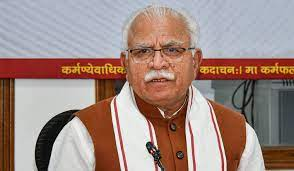CURRENT AFFAIRS
Get the most updated and recent current affair content on Padhaikaro.com
Anti-conversion Bill of Haryana govt’s
- IAS NEXT, Lucknow
- 08, Mar 2022

Reference News:-
Dr. Raghuvir Singh Kadian, a six-time MLA, was suspended in Haryana Assembly after he tore a copy of the Bill on the floor of the House.
- So far Uttar Pradesh, Karnataka, Himachal Pradesh, and Madhya Pradesh have enacted legislations to prevent unlawful religious conversions.
About the Haryana Prevention of Unlawful Conversion of Religious Bill, 2022:
- Aimed at prohibiting religious conversions which are affected through misrepresentation, force, undue influence, coercion, allurement or by any fraudulent means or by marriage or for marriage by making it an offense.
- Punishment: The Bill provides for greater punishment for such conversions in respect of minor, women, Scheduled Castes and the Scheduled Tribes.
- The burden of proof: It also provides for that the burden of proof as to whether a conversion was not affected through misrepresentation, use of force, under threat,
undue influence, coercion, allurement or by any fraudulent means or by marriage or for marriage for the purpose of carrying out conversion lies on the accused.
- Declaration: Every individual converting from one religion to another shall submit to the prescribed authority a declaration that the conversion affected through was not misrepresentation, use of force, under
threat, undue influence, coercion, allurement or by any fraudulent means or by marriage or for marriage and such authority shall make an inquiry in such cases.
Rationale behind the introduction of this Bill:
The Constitution confers on each individual the fundamental right to profess, practice and propagate his religion.
- However, the individual right to freedom of conscience and religion cannot be extended to construe a collective right to proselytize; for the right to religious freedom belongs equally to the person converting and the individual sought to be converted.
- Still, there have been umpteen cases of religious conversions, both mass and individual.
Rationale behind the enactment of anti-conversion laws:
- Threats of forceful conversion.
- Problem of Inducement or allurement.
- Religious conversion is not a Fundamental Right.
What do critics say?
Such laws have come under sharp criticism from several legal scholars who had contended that the concept of ‘love jihad’ did not have any constitutional or legal basis.
- They have pointed to Article 21 of the constitution which guarantees individuals the right to marry a person of one’s choice.
- Also, under Article 25, freedom of conscience, the practice and conversion of religion of one’s choice including not following any religion, are also guaranteed.
Supreme Court on Marriage and Conversion:
- The Apex Court of India in its several judgments has held that the state and the courts have no jurisdiction over an adult’s absolute right to choose a life partner.
- The Supreme Court of India, in both the Lily Thomas and Sarla Mudgal cases, has confirmed that religious conversions carried out without a bona fide belief and for the sole purpose of deriving some legal benefit do not hold water.
- Salamat Ansari-Priyanka Kharwar case of Allahabad High Court 2020: The right to choose a partner or live with a person of choice was part of a citizen’s fundamental right to life and liberty (Article 21).
Need of the hour:
- There is a need for uniformity: Article 18 of the Universal Declaration on Human Rights mentions everyone has the right to freedom of religion including changing their faith. Since it is a state subject, the Centre can frame a model law like Model law on contract farming etc.
- States while enacting anti-conversion laws should not put any vague or ambiguous provisions for the person who wanted to convert of his own will.
- The anti-conversion laws also need to include a provision to mention the valid steps for conversion by minority community institutions.
- People also need to be educated about the provisions and ways of Forceful conversions, Inducement or allurement, etc.